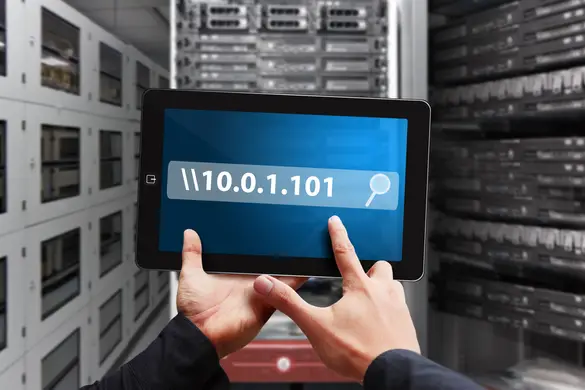
There are many differences between static vs dynamic IP addresses for businesses. In both cases, businesses use their IPs to present many beneficial functionalities. For example, they can host servers for various purposes, such as the internet, email, or FTP. Additionally, small businesses provide remote access to their corporate networks, host webcams for streaming and setup conferencing applications. As a business IT professional, you should consider the best IP address infrastructure for your unique business needs. For example, knowledge of these functionalities helps you secure the best WordPress servers for small business. In this post, we will discuss static vs dynamic IP addresses for small business.
The Difference Between Static vs Dynamic
Of course, you should know the characteristics of a static IP vs dynamic IP address for business. Simply put, a static IP address is one that does not change. These addresses are generally used by essential infrastructure components such as servers. Typically, they remain the same until you decommission the device or change your network infrastructure. Since static IPs are assigned by your ISP, they may increase your monthly rates, depending on your contract. Additionally, static IPs may use IPv4 or IPv6 infrastructure. Surely, static IP characteristics provide useful insights when comparing static vs dynamic IP addresses.
Static vs Dynamic IP Characteristics
Moreover, you must take in the characteristics of dynamic IP addresses when comparing them to static IPs. In simple terms, dynamic IP addresses are temporary and can change whenever your system or router is rebooted. Of course, these changes depend on how your ISP sets up their dynamic host configuration protocol (DHCP) server. Configurations of IP address lease times and assignments have a significant impact on the frequency of dynamic IP changes. You can gain valuable insights on these configurations and their impacts by using the phrase “my IP address” when contacting your ISP. Certainly, dynamic IP characteristics provide advanced insights into the static vs dynamic IP address debate for your business.
Business Functionalities Of Static IP
Additionally, static IP addresses present several different use cases when compared to dynamic IP. For example, a static IP facilitates hosting of your web-based, email, and file transfer protocol servers. Within these servers, static IPs offer accelerated upload and download speeds, so you can send and receive data rapidly. Moreover, VPNs and other remote access tools remember your static IP and trust its safety. Using this trust, you can facilitate convenient remote access and allow employees to work remotely. Absolutely, static IPs present a variety of business functionalities when comparing them to dynamic IPs.
Business Functionalities Of Dynamic IP
On the other hand, dynamic IP addresses present several examples differentiating them from static IP. First and foremost, dynamic IP’s frequent address changes make it harder for hackers to access or compromise your business devices. For further security improvements, you can check the best cybersecurity websites. Additionally, dynamic IP infrastructure saves significant amounts of time by eliminating the need to configure new devices manually. This way, many devices can use the dynamic IP simultaneously. Moreover, they generally cost less and require less maintenance than a static IP address. Definitely, know the business functionalities of dynamic IP addresses when comparing static vs dynamic IP addresses.
Which Is Best For Your Business?
Of course, you must ultimately determine which IP address is better for your unique business needs when comparing static vs dynamic IP addresses. Typically, the best IP address for your business depends on its unique needs. For example, if your business needs a stable, reliable network infrastructure, static IPs are best. On the other hand, dynamic IPs offer better privacy and security of your business data. The amount and sensitivity of this business data should have a significant impact on your decision. Additionally, there are several additional measures you can take to secure a static infrastructure. Before implementing these measures, evaluate their value against your business model and goals. Assuredly, you should use your static and dynamic IP address knowledge to determine which is best for your specific business.
Static vs dynamic IP addresses for business is an important conversation that drives your business’s network infrastructure. Of course, you should know static IP characteristics to provide useful insights when weighing static vs dynamic IP addresses. Additionally, static IPs present a variety of business advantages when comparing them to dynamic IPs. Moreover, learn several dynamic IP characteristics for advanced insights into the static vs dynamic IP address debate. Furthermore, take in the business advantages of dynamic IP addresses when comparing static vs dynamic IP addresses. Finally, use your static and dynamic IP address knowledge to determine which is best for your specific business. Using your knowledge of these IP types, you can secure the best network infrastructure and IP addresses for your business.
 Business First Family Business, Accounting, Finance, Investing, Marketing And Management
Business First Family Business, Accounting, Finance, Investing, Marketing And Management